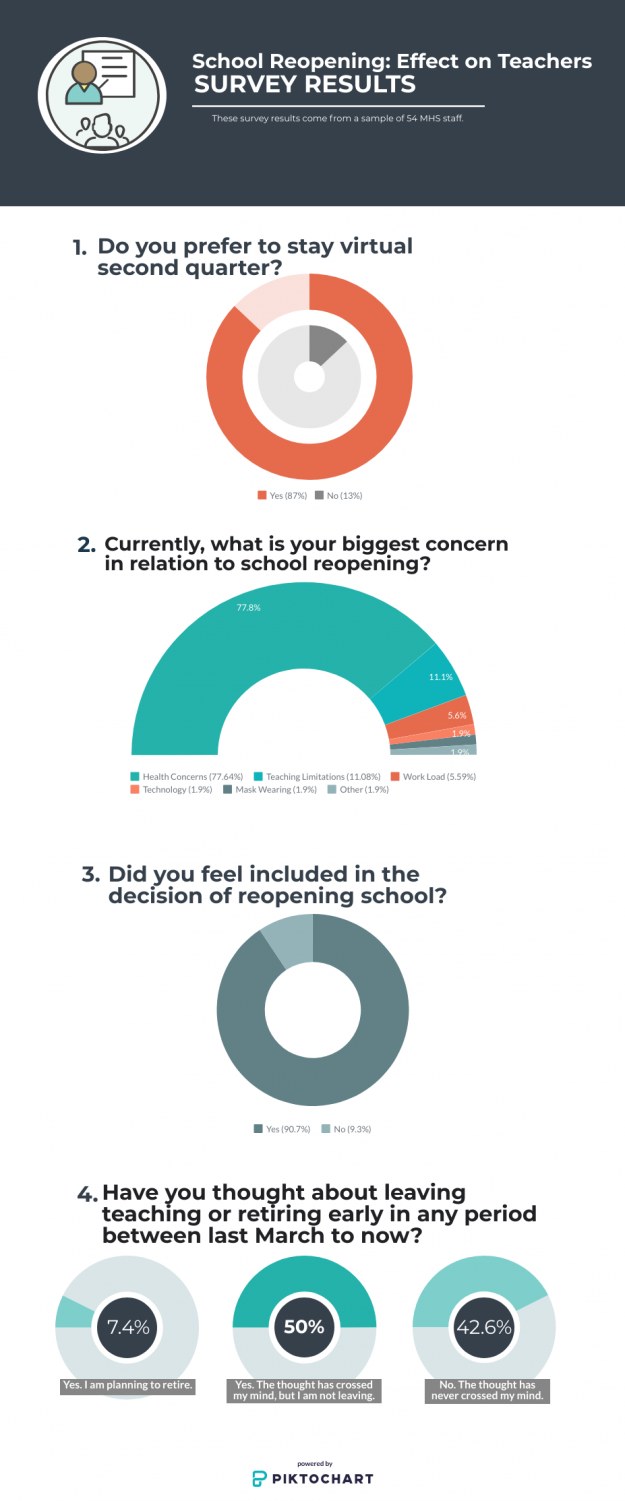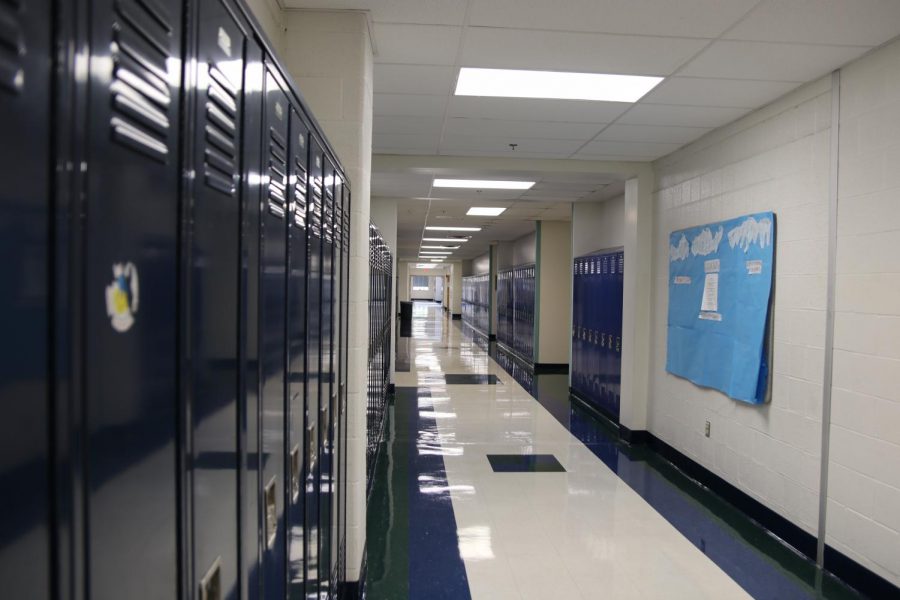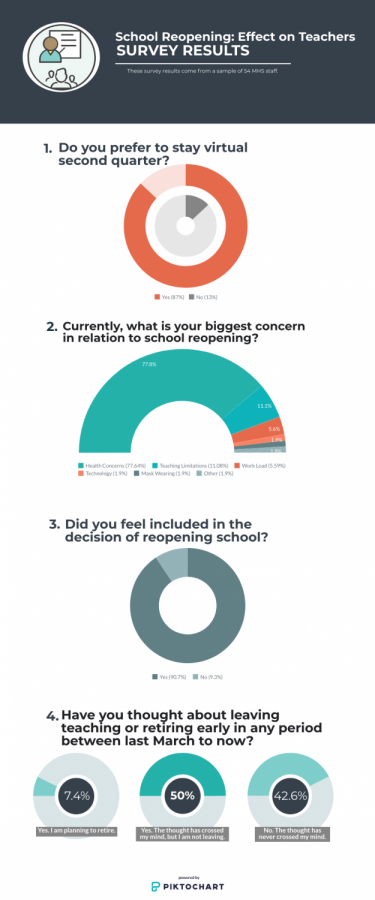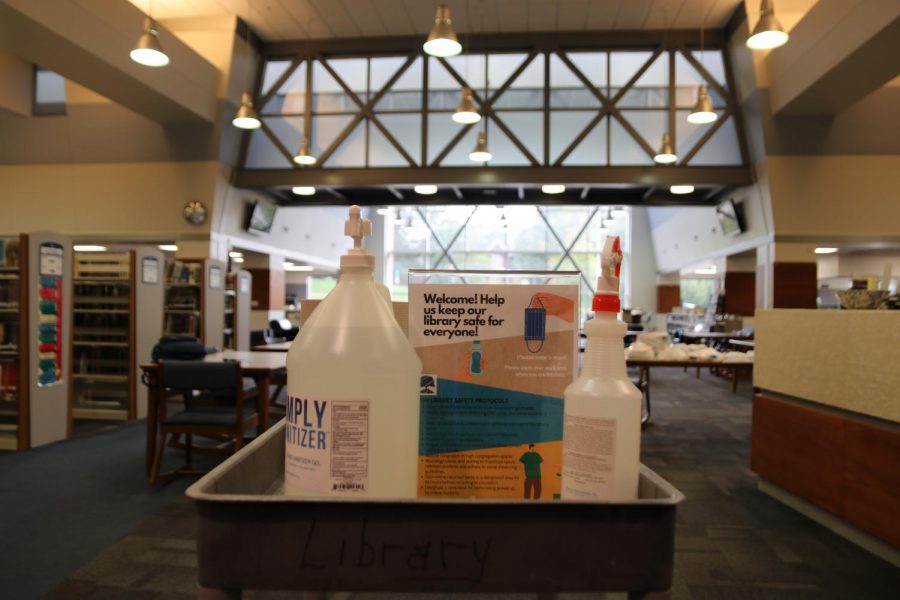Media by Lajja Patel
The Messenger surveyed MHS staff members about how they felt about school reopening. Here are the results.
Teachers Show Health Concerns for School Reopening
Jocelyn Theiss, Spanish teacher, was anxious about school reopening Thursday, Nov. 12, because of the interaction she’d then have with numerous staff and students.
“The idea of being exposed to more people outside of my normal social circle from the past eight months is daunting,” Theiss said.
Theiss said she is returning to school after maternity leave and now has a 4-month-old baby boy, Daniel. Because Daniel is a newborn, Theiss is concerned about him being affected by COVID-19, especially after she is exposed to a number of people at work.
Theiss said she plans to be very careful with her baby around and make sure social distance and wear masks during visits to see grandparents.
Theiss is not alone in her concerns. Janet Koch, business teacher, is worried about her personal health.
Koch said she is an overweight 60 year old who has high blood pressure, a combination that is not ideal during the pandemic.
Koch said returning to school will expose her to more people and increase her chances of contracting COVID-19 therefore impacting her family life.
“I have small grandchildren and don’t want to bring something home to them and I don’t want to be isolated from them either,” Koch said.
Koch said she feels teacher’s concerns were disregarded in the decision to return to in-person schooling and only parents’ interests were considered.
“I feel like all decisions are made under the cover of darkness, that the superintendents are in their ivory tower and only care about keeping the parents happy and do not care about the health, welfare and emotional well-being of the teachers and staff; therefore, I feel like teachers have become collateral damage in this COVID war,” Koch said.
Koch said the district makes decisions solely based on maintaining their image and using encouraging words to win teachers’ support.
“The district banks on our devotion when they make decisions, and then they give us a pep talk telling us we are awesome and amazing at our craft, but this isn’t enough considering the gravity of the current situation,” Koch said.
Koch said she has reached her breaking point this year and believes the district has failed to recognize that COVID-19 is far worse now than it was in March.
“They are rigid, and are the enforcers of policies, but never consider the human aspect of anyone’s situation,” Koch said.

Some staff, however, looked forward to returning to school and trusted the district despite the health concerns.
Edward Bolton, science teacher, was eager to teach in-person again.
Bolton said he is sure the district has put great precautions in place to insure everyone remains in good health. Although health is a concern, Bolton said educating his students properly is more vital.
Bolton said virtual learning is just an alternative to true learning; therefore, returning back to school with precautions should be the main focus.
“Online is for the birds. It is a hollow shell of an education,” Bolton said.
Assistant Principal Dr. Richard Regina is keeping a positive attitude about students returning to school and said extra precautions besides the obvious wearing of masks and social distancing are being put in place for teachers to feel safe.
“Some teachers have requested plexiglass and face shields, which we have purchased,” Dr. Regina said.
Principal Dr. Steve Hankins is aware of the worries about health that teachers have and said the decision to return was not taken lightly.
“The Board and superintendent based their decision on the recommendation from St. Louis County to return students to school as well as input from other community stakeholders, including teachers,” Dr. Hankins said.
Dr. Hankins said he shares the health concerns teachers have and understands how tough the situation is for them.
“I am always concerned about our teachers and their families,” Dr. Hankins said.
Teaching Limitations Concern Teachers
As students return in person Thursday, Nov. 12, Darcy Hachmeister, math teacher, was concerned about dividing her attention between students online and those in-person.
Hachmeister said it will be difficult to devote an equal amount of time to both groups; therefore, she feels one group’s learning will always be sacrificed in this process.
“I take that very personally in that I will not be able to perform my job as well as I want, which causes me to worry about the kids that are not getting the help they should be able to get,” Hachmeister said.
Hachmiester said she believes in-person students will have a clear advantage because they are receiving immediate feedback. She said the district’s overall decision to use the quarter system has made the teacher’s job incredibly difficult and those difficulties increase with the school reopening.
Teachers are having difficulties adapting to ongoing changes and are facing limitations to teaching effectively due to the reopening of school.
Scott Szevery, history teacher, is struggling with the idea of not only dealing with two groups of students but also having to share his classroom with another teacher.
Szevery said he is aware that sharing a classroom does not mean teaching at the same time. But, he said his worries revolve around handling preparations for lectures along with students coming in and out of class.
“We have to set up the room to allow us both to use our teacher desks and instructional technology, plus figuring out how to manage all of our students coming and going,” Szevery said.
Szevery is not the only one worried about adapting to the new system.
Katherine Bauman, history teacher, has been working past contracted hours in order to keep up with the constant changes.
Bauman said she is worked up about planning lectures and spends far too much time managing her college class. She said she has logged 350 hours first quarter for her AP European History class alone.
Bauman said she hopes parents and students will reach out to teachers and appreciate their diligent work these past few months.
“Every teacher I have talked to is exhausted and burned out because they are working way beyond contracted hours so please remember to thank them,” Bauman said.
Patrick Schrappen, science teacher, is also contributing large amounts of time as well as his own money to try give students the most efficient education.
Schrappen said he has invested in a webcam and extension cable so he can show students online his work on the whiteboard. He said he also has purchased a GoPro to film labs and other demos.
Schappen said his first priority is that students learn the course material.
“If I don’t pay for my own technology and learning suffers, then it is my fault because I was not willing to go the extra mile for my students,” Schrappen said.
Schrappen said he had no choice but to buy necessary technology in order to teach virtual students as effectively as those in-person.
“I am not happy with being told to do the best possible but the district does not have
many resources to assist teachers,” Schrappen said.
Associate Principal Dr. Tracy Waeckerle is certain returning to school is the best option.
Dr. Waeckerle said she is aware teachers are faced with difficulties this year and have had to face many challenges.
In regards to sharing classrooms and spacing issues, Dr. Waeckelre said it is not possible for all teachers to have individual classrooms due to MHS having the largest student population in the district.
Dr. Waekerle said the administration is facing unexpected obstacles along with the teachers and is trying to provide all staff with materials they need.
“As far as classroom materials, we have done our best to be able to purchase items that teachers have requested to help them with their instruction this year as our budget has allowed,” Dr. Waeckerle said.
Dr. Waeckerle said teachers are given the opportunity to speak their concerns and the Rockwood Learning Council is actively working to help solve any issues teachers may have.
She said the administration is willing to help staff as much as possible through the current complications present with returning to school.
“Building administrators continue to work with staff to address needs in their classrooms including additional technology, PPE and room spacing to help with the transition back to in-person learning,” Dr. Waeckerle said.
The Messenger has reached out to the Rockwood National Education Association (RNEA), the teachers’ label union, but has received no response.



